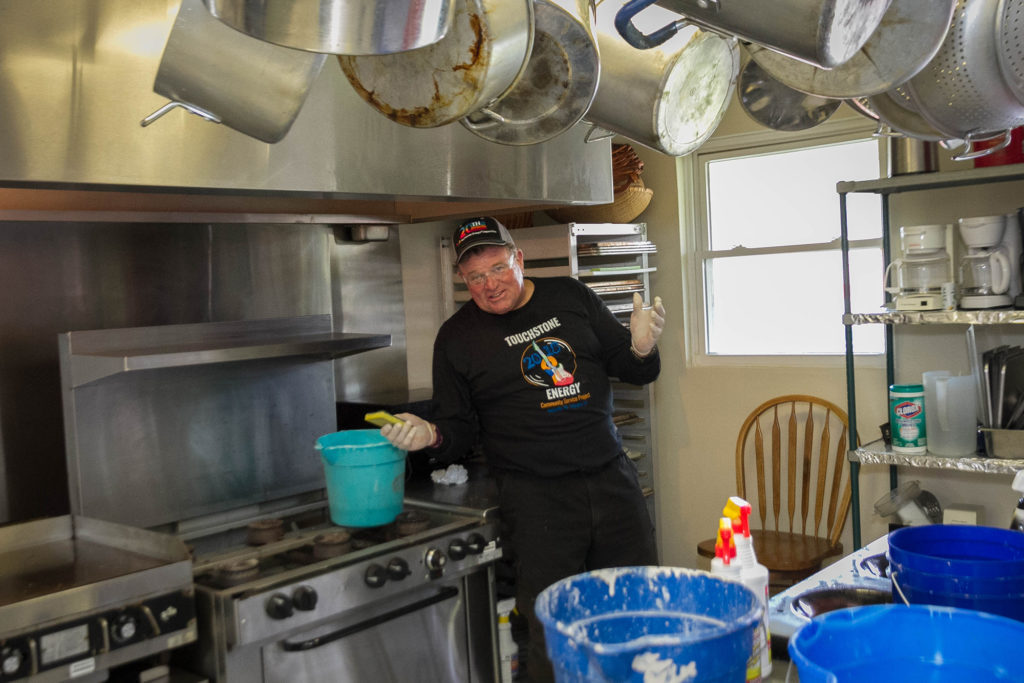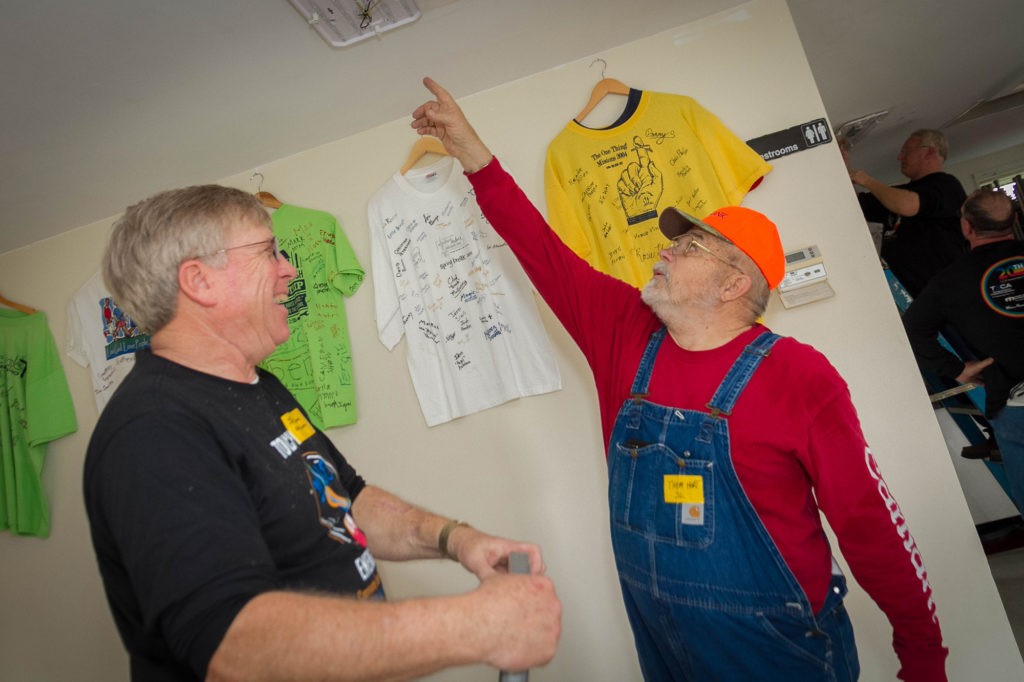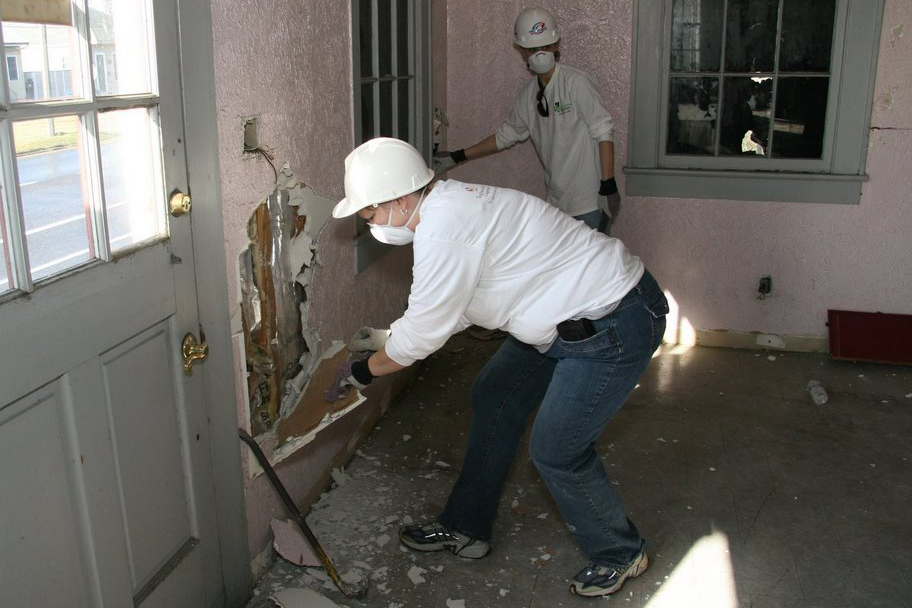
SMYRNA, Tenn.—Cooperation Among Cooperatives and Concern For Community aren’t ideas to consider only on weekdays from 9 to 5. As Cooperative Principles No. 6 and 7, they’re something to be acted on whenever, wherever possible.
In this case, it was on a beautiful, unseasonably warm winter Saturday, about 25 miles southeast of Nashville, when more than 100 people from the electric co-op community turned the principles into practice.
They came to the Wherry Housing Co-op to lend a hand in Touchstone Energy® Cooperatives’ 10th annual community service project, held Feb. 24 in conjunction with the NRECA Annual Meeting.
To say their help was appreciated would be a gross understatement.
The American Dream

Long before it became Wherry Housing Co-op, the property was part of Sewart Air Force Base, which closed in 1971. The buildings were constructed as barracks between the late 1940s and early 1950s.
The co-op began in 1984 and today is low- to moderate-income housing. Many families are from several Latin American countries, while others are refugees from Myanmar seeking their bit of the American dream.
“It’s a stepping stone, hopefully, for people to be able to save some money and go to the next phase of their life. And several this year already have bought homes,” said Michael Hendrickson, supervisor at Wherry.
The co-op receives no government subsidies and tries to keep rents as economical as possible. Two-bedroom units are $575 per month. A three-bedroom flat with 990 square feet is $625. It’s quite the deal in a county where rentals generally run about $100 a square foot.
“We average about five or six people a day knocking on the door or calling on the phone looking for housing. There’s not enough moderate income housing in Rutherford County that is not income-based,” said Hendrickson.
Hendrickson said Wherry does all it can to avoid raising rents. And it’s expensive to renovate units. So it’s grateful for folks like the Touchstone Energy volunteers.
In fact, Jason Dye was especially glad to see them.
Dye is the only maintenance man at Wherry.
“It’s a never-ending job,” he said of keeping up the 55-acre property with more than 100 buildings. “Plumbing, roofing, electrical—you name it, I do it,” said Dye.
“To have the co-ops out here helping, it’s just incredible. We can’t thank them enough.”
Dye is pretty incredible himself.
“Six years ago I owned my own plumbing business. I got a call out here. They needed a plumbing job done. I fell in love with the place,” he recalled. Soon after, Dye gave up his business to work at Wherry.
Labor of Love
You’d have to forgive anyone unfamiliar with an electric co-op for wondering why someone would give up a Saturday in Nashville to go to a community service project. Those best qualified to explain it are the one who do it.
Like Vicky Foster, whose husband, Butch, is on the board at Butler REC in Oxford, Ohio. Wet rag in her hand, she was washing all of the dishes and cleaning out the refrigerators in a community building.
“I like to give back to communities. I love to do community service,” said Foster, who was only too happy to work in the kitchen.
“I volunteered for this because I’m a good cleaner. I’m not an electrician.”
Talk about sweat equity. His face dripping wet in the hot kitchen, Geoff Oldfather was spending his eighth Touchstone Energy community service project cleaning grease off the cooking hood.
“I signed up for this. I saw four or five that involved wiring. I said, ‘No way. Give me a scrub pad and a kitchen hood,’” said Oldfather, cooperative communications and public relations manager for Arizona G&T Cooperatives in Benson.
Sylvia Grove was nearby, scraping grease off of the industrial stove.
“I worked in an industrial kitchen at one time, so this is like my old stomping ground,” said Grove, who came with her father, Jay, board president at Adams Electric Cooperative in Gettysburg, Pennsylvania.
“Just being part of a community project like this and giving back—this is what all the cooperatives are made of,” said the elder Grove, a dairy farmer by trade who was busy drilling a lighting fixture into a ceiling.
He was getting a hand from a guy who knows a thing or two about electricity. Tom Hart, a director at Auburn, Illinois-based Rural Electric Convenience Cooperative, is a retired lineman.
“We’re helping each other out,” said Hart.
There was no shortage of CEOs trading business duds for jeans.
Kristin Dolan, CEO of Runestone Electric Association in Alexandria, Minnesota, was thrilled to be at her first annual meeting service project—and not just because it was 2 degrees back home.
“I’m an 11-year Rotarian and we do a lot of service projects,” said Dolan. “I like to serve, and I think that’s what a lot of the people who work in the cooperative industry like. It’s a higher purpose. It feels good to serve people. I’ll do that over touristy-type entertainment venues any day.”
Sean Vanslyke, CEO of SEMO Electric Cooperative, brought two members of his staff from their Sikeston, Missouri, headquarters.
“It’s exciting for me to watch their eyes get excited about helping somebody else,” said Vanslyke, whose contingent included Dannett Cooper, supervisor of member services.
“I thought it was a good opportunity to come and serve other areas that our fellow cooperatives serve,” said Cooper, who spent the morning packaging food and delivering it to local residents.
“It was nice that we got to speak to them and know their stories,” she said. “It’s just been a great experience.”
Wherry is served by Middle Tennessee EMC, whose CEO, Chris Jones, was delighted to welcome his co-op colleagues from near and far.
“I think the folks coming from across the country—and we appreciate all of them so much—they very quickly see they can make a quick difference. And that’s what’s happened today,” said Jones.
A Decade of Helping

2018 marks a decade of Touchstone Energy community service projects at the NRECA Annual Meeting. The tradition began in New Orleans on Feb. 14, 2009, when about 100 co-op employees and their families ventured beyond Bourbon Street to a part of town desperately in need of help.
“They grabbed chisels, crowbars and crosscut saws and went to work. Their mission: to help the elderly and disabled return to homes heavily damaged by Hurricane Katina in 2005,” Electric Co-op Today reported in its Feb. 27, 2009, edition.
For Lynn Moore, 2018 was her ninth service project, but first as Touchstone Energy’s executive director. She’s seen it grow beyond what anyone ever imagined.
“We started off with 100 volunteers on the first project. After 10 years we’ve reached 1,000-plus volunteers with thousands of hours of service,” said Moore. “There’s something about people coming together in community that allows them to give freely of their cooperative and volunteer spirit. They want to do it. They want to make a difference in the community.”
And it does make a difference—even the little things.
“The folks living here are on a limited income. Coming in and saving them a little bit of money on LED lighting—it may not seem like a lot to other people, but to them it can make a difference. It can make a huge difference,” said Moore, whose husband, Scott, was helping swap out old fluorescent lighting fixtures with LEDs.
Since 2009 the service projects have crisscrossed the nation. Volunteers have made energy efficiency improvements to a school in Georgia and to homes in Florida and California. They twice returned to help New Orleans. The last time the meeting was in Nashville in 2014, they helped build Habitat for Humanity homes.
“Can you believe that this is the 10th community service project we’ve done? Some volunteers have been to nearly all of our events over the years,” said Alan Shedd, Touchstone Energy’s director of energy solutions.
Shedd said putting together these events is truly a cooperative effort. He credited Jay Sanders at Middle Tennessee EMC and McKenna Soloway with United Way of Rutherford and Cannon Counties for doing “a huge amount of work to plan, organize, and execute the project.” And while identifying and helping plan projects for 120 volunteers can be daunting, Shedd said the staff at Wherry was spot on.
“I showed up on Friday morning and everything was ready to go: tools, materials, refreshments. Each one of the 14 sites we worked had maps, contacts, task lists in place,” said Shedd, who also thanked the Tennessee Electric Cooperative Association for providing lunch.
Just two weeks after registration opened for this year’s event it had to be closed when they reached the maximum number of volunteers who could be accommodated. That brings a smile to Shedd’s face.
“It speaks to the generous spirit of cooperatives that they would travel to the meeting early, give up a Saturday, and volunteer to help people they’ve never met under what sometimes can be challenging conditions.”
Michael W. Kahn is a staff writer at NRECA.